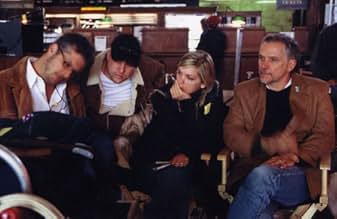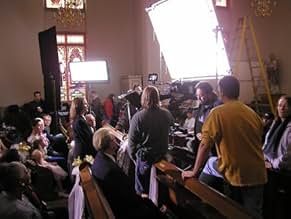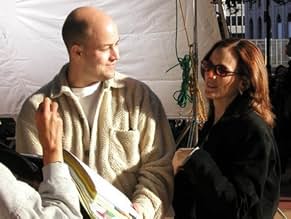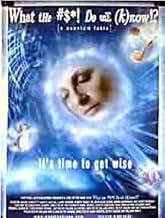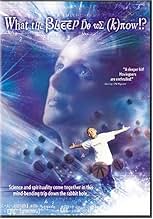CALIFICACIÓN DE IMDb
5.2/10
14 k
TU CALIFICACIÓN
La búsqueda de una fotógrafa de ficción para redescubrirse espiritualmente a sí misma se entremezcla con imágenes documentales de científicos y teólogos que discuten los aspectos filosóficos... Leer todoLa búsqueda de una fotógrafa de ficción para redescubrirse espiritualmente a sí misma se entremezcla con imágenes documentales de científicos y teólogos que discuten los aspectos filosóficos de la física cuántica.La búsqueda de una fotógrafa de ficción para redescubrirse espiritualmente a sí misma se entremezcla con imágenes documentales de científicos y teólogos que discuten los aspectos filosóficos de la física cuántica.
- Dirección
- Guionistas
- Elenco
- Premios
- 2 premios ganados en total
James Langston Drake
- Groom
- (as Jame Drake)
Michele Mariana
- Tour Guide
- (as Michelle Mariana)
Opiniones destacadas
It's nice to see that there are some movies being made and released into mainstream theaters that actually make you think. Great fictional films do this through the delivery of their stories, but What the #$*! Do We Know does it in a much more direct way, almost like an educational film. It's a fascinating exploration of existential theories and philosophy, and is one of those very rare movies that will challenge the way you think even about everyday life. It's a strange film and moves entirely too fast for much of it's material to sink in, but it's a great exploration of quantum physics and some of the implications that it has on our lives that we really don't think about, but should.
The story sporadically focuses on the life of Amanda (Marlee Matlin), a deaf woman suffering through heartbreak and work troubles but who ultimately alters her perception by applying certain rules and theories of quantum physics, as I imagine we are expected to after seeing the movie. The great thing about the movie is that it makes you think, but the biggest problem with it is that it uses presentation to make simple statements seem grand and make crazy assertions seem like they have merit.
There is one point where the movie says, "Here's a puzzle - why should we be able to remember the past and not have the same access to the future?'' What is that? A completely obvious fact of linear time is rendered strange just by being in this movie. It's odd that the movie delves so deep into such statuesque disciplines as quantum physics and the very fabric of the universe, while not knowing why you can remember a conversation you had today, but for some weird, unknown and mysterious reason, you can't remember a conversation you will have tomorrow.
The film also makes outlandish claims and then shrouds them in the mysteriousness of unobservable history. There is a part of the movie that claims that when the first ships arrived in what is now North America, the Native Americans looked out to sea and saw the water parted by the ships, but could not see the ships themselves because they had never seen anything like them before. This, obviously, is utter nonsense, but the movie uses it as an example of its suggestion that there are different levels of reality for different people. There is no pure, objective reality, but different plains of existence for different people.
A friend of mine, who hails this as one of the greatest films he's ever seen, explained to me that the Native Americans' minds simply did not understand how to decode the concept of a ship, a signifier which they had never encountered and so it was perfectly understandable that they couldn't see it. Wrong! Sure, they had never seen ships before, but I am willing to go out on a limb and assume that they had seen wood before, and since vision is merely the process of light bouncing off of objects and coming into contact with the retina inside the eye, it is physically impossible for a Native American to have x-ray vision because he or she doesn't know what a certain object is.
My friend used the example that it is not until you learn that lightning travels from the ground to the clouds rather than the other way around that you really begin to see it that way. Before you learn that curious little fact, you see lightning and are completely sure that it's coming out of the clouds and zapping the earth. You do see it differently from then on, it's true, but you did SEE it before you knew where it originated, right? And incidentally, lightning is known to travel from the ground to the clouds, from the clouds to the ground, and from one cloud to another. But when it occurs, I am willing to suggest that it's rarely invisible, even if, as they say, there's no one there to see it.
I believe that the human mind is set up to believe what it wants to believe (hence religion), but I do not feel obliged to believe that people's beliefs or knowledge enable them to see through solid objects just because they've never seen them before, nor do I believe that any human has the ability to change the molecular structure of water just by thinking about it in a certain way, which is another of the more bizarre claims that the movie makes. I don't know, I just never thought of water as susceptible to being offended or made happy, or having any effect over human emotions.
But while the movie does slip up by going a little far in claims like these, it's important to have things like this because even for things like invisible ships, which we know are not reality, it is good that it makes you think about them. There are a lot of things in the world that we take for granted, and not just possessions but truths, and it is movies like What the #$*! Do We Know that really get people thinking about them. For a while, at least.
The story sporadically focuses on the life of Amanda (Marlee Matlin), a deaf woman suffering through heartbreak and work troubles but who ultimately alters her perception by applying certain rules and theories of quantum physics, as I imagine we are expected to after seeing the movie. The great thing about the movie is that it makes you think, but the biggest problem with it is that it uses presentation to make simple statements seem grand and make crazy assertions seem like they have merit.
There is one point where the movie says, "Here's a puzzle - why should we be able to remember the past and not have the same access to the future?'' What is that? A completely obvious fact of linear time is rendered strange just by being in this movie. It's odd that the movie delves so deep into such statuesque disciplines as quantum physics and the very fabric of the universe, while not knowing why you can remember a conversation you had today, but for some weird, unknown and mysterious reason, you can't remember a conversation you will have tomorrow.
The film also makes outlandish claims and then shrouds them in the mysteriousness of unobservable history. There is a part of the movie that claims that when the first ships arrived in what is now North America, the Native Americans looked out to sea and saw the water parted by the ships, but could not see the ships themselves because they had never seen anything like them before. This, obviously, is utter nonsense, but the movie uses it as an example of its suggestion that there are different levels of reality for different people. There is no pure, objective reality, but different plains of existence for different people.
A friend of mine, who hails this as one of the greatest films he's ever seen, explained to me that the Native Americans' minds simply did not understand how to decode the concept of a ship, a signifier which they had never encountered and so it was perfectly understandable that they couldn't see it. Wrong! Sure, they had never seen ships before, but I am willing to go out on a limb and assume that they had seen wood before, and since vision is merely the process of light bouncing off of objects and coming into contact with the retina inside the eye, it is physically impossible for a Native American to have x-ray vision because he or she doesn't know what a certain object is.
My friend used the example that it is not until you learn that lightning travels from the ground to the clouds rather than the other way around that you really begin to see it that way. Before you learn that curious little fact, you see lightning and are completely sure that it's coming out of the clouds and zapping the earth. You do see it differently from then on, it's true, but you did SEE it before you knew where it originated, right? And incidentally, lightning is known to travel from the ground to the clouds, from the clouds to the ground, and from one cloud to another. But when it occurs, I am willing to suggest that it's rarely invisible, even if, as they say, there's no one there to see it.
I believe that the human mind is set up to believe what it wants to believe (hence religion), but I do not feel obliged to believe that people's beliefs or knowledge enable them to see through solid objects just because they've never seen them before, nor do I believe that any human has the ability to change the molecular structure of water just by thinking about it in a certain way, which is another of the more bizarre claims that the movie makes. I don't know, I just never thought of water as susceptible to being offended or made happy, or having any effect over human emotions.
But while the movie does slip up by going a little far in claims like these, it's important to have things like this because even for things like invisible ships, which we know are not reality, it is good that it makes you think about them. There are a lot of things in the world that we take for granted, and not just possessions but truths, and it is movies like What the #$*! Do We Know that really get people thinking about them. For a while, at least.
I was not surprised to see many of the comments here about this film calling into question everything about it's premise. While reviewing this film for my newspaper (Cedar Rapids Gazette) I knew immediately that the concepts would be controversial and hard for the conditioned American mind to wrap itself around.
Having said that, it seems that many people view a movie like this as an all or nothing proposition -- if one theory or belief seems flawed, then it all must be called into question. What I think too many polemicists are forgetting is that this picture is a smorgasbord of different theories presented, as Rod Serling might say, for you approval -- or not.
But what many are missing is what makes this film revolutionary -- that filmmakers were able to present these concepts in the medium of film in a way that was at least entertaining and most, thought provoking. You don't have to buy off 100 percent on what is here, but the presentation, in and of itself, was stunning in its bombardment of the viewer with multi sensory imagery.
That this film was even made at all is a mini-miracle, especially in our current intellectual and cultural climate. Its sad to me to see such judgmental reviews. I knew conventional Christians would simply dismiss this as "new age" fluff and I mentioned that in my review. But I would have hoped that lovers of film and higher order thinking would be more tolerant of some of the excesses.
In short, this is a film that needs to be seen not just for its quasi-cinematic, quasi-documentary methodology but for a presentation of theories and beliefs that are rarely discussed in the ossified American mainstream. For that alone, I thank the filmmakers.
Having said that, it seems that many people view a movie like this as an all or nothing proposition -- if one theory or belief seems flawed, then it all must be called into question. What I think too many polemicists are forgetting is that this picture is a smorgasbord of different theories presented, as Rod Serling might say, for you approval -- or not.
But what many are missing is what makes this film revolutionary -- that filmmakers were able to present these concepts in the medium of film in a way that was at least entertaining and most, thought provoking. You don't have to buy off 100 percent on what is here, but the presentation, in and of itself, was stunning in its bombardment of the viewer with multi sensory imagery.
That this film was even made at all is a mini-miracle, especially in our current intellectual and cultural climate. Its sad to me to see such judgmental reviews. I knew conventional Christians would simply dismiss this as "new age" fluff and I mentioned that in my review. But I would have hoped that lovers of film and higher order thinking would be more tolerant of some of the excesses.
In short, this is a film that needs to be seen not just for its quasi-cinematic, quasi-documentary methodology but for a presentation of theories and beliefs that are rarely discussed in the ossified American mainstream. For that alone, I thank the filmmakers.
About 20 years ago, I encountered quantum mechanics in The Dancing Wu Li Masters by Gary Zukav, and the Tao of Physics by Fritjof Capra. Despite the *relative* popularity (note the emphasis on "relative") of such books, the average person in the street has never read a science book that wasn't assigned to them in high school or college. And those books certainly weren't speculating on the nature of Life, the Universe and Everything based on the implications of quantum physics!
In my own life, awareness of the intersection of science of spirituality has given me a smidgen of additional fuel in my life of studying Christian and Eastern mysticism. So imagine my delight when I learned "What the Bleep" promised an exciting investigation into the cutting edge of science and spirituality. Surely there would interviews with people like Rupert Sheldrake, Freeman Dyson, and Larry Dossey!
Well, no, although most of the scientists were well-qualified to speak on the quantum concepts addressed. Strangely, the film undercut itself intellectually by not giving the names and qualifications of the speakers underneath their "talking heads" but only at the end. Regarding spiritual speculations, I find Capra, Sheldrake, and Dossey have more depth when it comes to this sort of thought, but the opinions shared may be eye-opening for many viewers who have never considered the inter-connectedness of mind, the universe, and God.
"What the bleep" has a beautiful visual style, exciting graphic effects, and also gets out of typical documentary mode by creating a small story of a deaf woman photographer's frustrations with life. The "Polish Wedding" sequence is hilarious, and might actually have you rolling in the aisles, as it did me!
The disappointment comes, oddly enough from the "Spiritual Teachers, Mystics, and Scholars" used. Sounds impressive right? There were only two. One was "Miceal" Ledwith, (elsewhere spelled Micheal), former member of the Catholic International Theological Commission, (who retired from Maynooth College in Ireland about the same time he made a private settlement regarding sexual abuse of a minor--see the Irish Times article of June 1 2002). The other was--get ready--RAMTHA! Yes, Ramtha, the absurd "Neolithic entity" supposedly channeled by JZ Knight.
Both Ledwith and Ramtha seemed to only be used to bash conventional religion with "the shackles of restrictive doctrine," and in Ramtha's case, assure us all that we are God. Yippee! No need to worry about meditation, service, or denying the ego. Why, I wondered, would someone go to the trouble of sharing the scientific plausibility of mysticism only to undercut it with the bitter statements of a former Catholic priest and the laughingstock of New-Age kookiness?
Perhaps it's because, according to Wikipedia.org, all three filmmakers are students of the Ramtha School of Enlightenment. Ultimately this was a long, entertaining commercial. Ramtha will see you now. Keep your ego, but bring your checkbook.
In my own life, awareness of the intersection of science of spirituality has given me a smidgen of additional fuel in my life of studying Christian and Eastern mysticism. So imagine my delight when I learned "What the Bleep" promised an exciting investigation into the cutting edge of science and spirituality. Surely there would interviews with people like Rupert Sheldrake, Freeman Dyson, and Larry Dossey!
Well, no, although most of the scientists were well-qualified to speak on the quantum concepts addressed. Strangely, the film undercut itself intellectually by not giving the names and qualifications of the speakers underneath their "talking heads" but only at the end. Regarding spiritual speculations, I find Capra, Sheldrake, and Dossey have more depth when it comes to this sort of thought, but the opinions shared may be eye-opening for many viewers who have never considered the inter-connectedness of mind, the universe, and God.
"What the bleep" has a beautiful visual style, exciting graphic effects, and also gets out of typical documentary mode by creating a small story of a deaf woman photographer's frustrations with life. The "Polish Wedding" sequence is hilarious, and might actually have you rolling in the aisles, as it did me!
The disappointment comes, oddly enough from the "Spiritual Teachers, Mystics, and Scholars" used. Sounds impressive right? There were only two. One was "Miceal" Ledwith, (elsewhere spelled Micheal), former member of the Catholic International Theological Commission, (who retired from Maynooth College in Ireland about the same time he made a private settlement regarding sexual abuse of a minor--see the Irish Times article of June 1 2002). The other was--get ready--RAMTHA! Yes, Ramtha, the absurd "Neolithic entity" supposedly channeled by JZ Knight.
Both Ledwith and Ramtha seemed to only be used to bash conventional religion with "the shackles of restrictive doctrine," and in Ramtha's case, assure us all that we are God. Yippee! No need to worry about meditation, service, or denying the ego. Why, I wondered, would someone go to the trouble of sharing the scientific plausibility of mysticism only to undercut it with the bitter statements of a former Catholic priest and the laughingstock of New-Age kookiness?
Perhaps it's because, according to Wikipedia.org, all three filmmakers are students of the Ramtha School of Enlightenment. Ultimately this was a long, entertaining commercial. Ramtha will see you now. Keep your ego, but bring your checkbook.
OK, first I'm going to tear down the "Columbus's ships" thing. I'm fairly certain the Caribbeans had some sort of seaworthy craft, such as rafts or canoes. From these, any normal human intelligence can extrapolate their concept of "boat" to include these ships. Also, where did the writer get this story? Source? Since it's not common knowledge, you need a source.
Next is the direction of time question. In Stephen Hawking's "A Brief History of Time," he talks about the 4 arrows of time accepted by the scientific community at large. While it is true that some fundamental (classical/Newtonian) physical laws don't care which direction time is going, many do. The arrow that I remember (it's been a while since I last read the book) is the thermodynamic arrow of time, which causes us to experience events in such a way that the entropy, or disorder, of the universe increases. For example, a cup falls off a table and breaks, not the other way around.
Ah, then the probability discussion. Yes, for subatomic particles like electrons and quarks, the probability wave is spread out enough that the particle can be in >1 place at a time. However, when you look at anything larger than these specks, the waves get exponentially more concentrated, so that a large (visible w/naked eye) object really has an infinitesimal probability of being in more than one state. So small is this probability that you would have to watch a "large" object say, a tennis ball, for more than the present age of the universe (15,000,000,000 years) for it to have an appreciable chance of doing anything strange.
Closely linked to my last paragraph is the talk about particles popping in and out of existence. The answer to "where do they go" is "they turn back into energy." This is what E=mc^2 means. In the "vacuum" of space, particle/antiparticle pairs of subatomic particles are constantly being created from random energy fluctuations, but these particles are existing on borrowed energy, which they very soon have to repay by annihilating with their mate.
Next is the water conversation. First of all, those pictures were of FROZEN water, which the narrator conveniently forgot to mention, only saying the jars were "left out overnight". Next, the claim that our bodies are 90% water is completely bogus. If that were true, there'd be no way we could so much as stand up. Instead: newborns have around 78%, 1-year-olds around 65%, adult men about 60%, and adult women around 55% (http://www.madsci.org/posts/archives/may2000/958588306.An.r.html).
This sheds doubt upon the rest of this "experiment."
The claim that if you only believe enough, you could walk on water is another seriously questionable one. If it's true, why didn't they show us? Tape someone walking on water. Even though you could fairly easily fake it with some video editing software, it'd still be a little more convincing than them simply telling us it's so. Using this "positive thinking" idea to then say that you create your own reality is equally flawed. Sure, I can very well believe that I live in a world inhabited by one-eyed, one-horned, flying, purple people-eaters, but that's irrelevant if the beings you interact with don't see the world this way.
And then the movie goes on to preach to us about God! How can a "scientific" movie propose to do this? Actually, I have a problem with that one guy proscribing what God is and what He isn't. Shouldn't that be up to the individual, thank you very much? Also in this part, one of the women commentators mentions that we have "antigravity." No, we don't. It's that simple.
Biology's not my thing, but there's a point where you just have to bring out a contradiction. One lady says that if you keep bombarding a cell with a certain chemical, the receptors on that cell will decrease. But soon after, a guy comes on and says that this same daily bombardment will cause the cell to produce a new cell when it divides that has MORE of the receptors. Contradiction. Oops.
I also have to comment on the guy who earlier on this board said this movie would appeal to anyone who's read "The Elegant Universe" by Brian Greene. I strongly disagree; I own and have read that book, and nowhere are its ideas remotely connected to this movie's ideas.
Lastly, I will agree with whoever said the movie is rather drawn out. Especially at the end. They just won't stop talking. They keep on going. Repeating the same stuff over and over. Which is what I'm doing for effect, if you couldn't figure that out.
Next is the direction of time question. In Stephen Hawking's "A Brief History of Time," he talks about the 4 arrows of time accepted by the scientific community at large. While it is true that some fundamental (classical/Newtonian) physical laws don't care which direction time is going, many do. The arrow that I remember (it's been a while since I last read the book) is the thermodynamic arrow of time, which causes us to experience events in such a way that the entropy, or disorder, of the universe increases. For example, a cup falls off a table and breaks, not the other way around.
Ah, then the probability discussion. Yes, for subatomic particles like electrons and quarks, the probability wave is spread out enough that the particle can be in >1 place at a time. However, when you look at anything larger than these specks, the waves get exponentially more concentrated, so that a large (visible w/naked eye) object really has an infinitesimal probability of being in more than one state. So small is this probability that you would have to watch a "large" object say, a tennis ball, for more than the present age of the universe (15,000,000,000 years) for it to have an appreciable chance of doing anything strange.
Closely linked to my last paragraph is the talk about particles popping in and out of existence. The answer to "where do they go" is "they turn back into energy." This is what E=mc^2 means. In the "vacuum" of space, particle/antiparticle pairs of subatomic particles are constantly being created from random energy fluctuations, but these particles are existing on borrowed energy, which they very soon have to repay by annihilating with their mate.
Next is the water conversation. First of all, those pictures were of FROZEN water, which the narrator conveniently forgot to mention, only saying the jars were "left out overnight". Next, the claim that our bodies are 90% water is completely bogus. If that were true, there'd be no way we could so much as stand up. Instead: newborns have around 78%, 1-year-olds around 65%, adult men about 60%, and adult women around 55% (http://www.madsci.org/posts/archives/may2000/958588306.An.r.html).
This sheds doubt upon the rest of this "experiment."
The claim that if you only believe enough, you could walk on water is another seriously questionable one. If it's true, why didn't they show us? Tape someone walking on water. Even though you could fairly easily fake it with some video editing software, it'd still be a little more convincing than them simply telling us it's so. Using this "positive thinking" idea to then say that you create your own reality is equally flawed. Sure, I can very well believe that I live in a world inhabited by one-eyed, one-horned, flying, purple people-eaters, but that's irrelevant if the beings you interact with don't see the world this way.
And then the movie goes on to preach to us about God! How can a "scientific" movie propose to do this? Actually, I have a problem with that one guy proscribing what God is and what He isn't. Shouldn't that be up to the individual, thank you very much? Also in this part, one of the women commentators mentions that we have "antigravity." No, we don't. It's that simple.
Biology's not my thing, but there's a point where you just have to bring out a contradiction. One lady says that if you keep bombarding a cell with a certain chemical, the receptors on that cell will decrease. But soon after, a guy comes on and says that this same daily bombardment will cause the cell to produce a new cell when it divides that has MORE of the receptors. Contradiction. Oops.
I also have to comment on the guy who earlier on this board said this movie would appeal to anyone who's read "The Elegant Universe" by Brian Greene. I strongly disagree; I own and have read that book, and nowhere are its ideas remotely connected to this movie's ideas.
Lastly, I will agree with whoever said the movie is rather drawn out. Especially at the end. They just won't stop talking. They keep on going. Repeating the same stuff over and over. Which is what I'm doing for effect, if you couldn't figure that out.
The movie got a lot of the quantum theory and neurology right, but then it proceeds to make a lot of wild tangential claims that are loosely based on the theory and pass it off as the absolute truth. Anybody with a advanced physics background (my job requires an advanced math and physics background) will be deeply turned off (despite the fact that a number of physicists and neurologists are interviewed for the film). The scientists back up the scientific theory, but then some new age woman and others (some scientists, but mainly that woman) kept on saying things that were loosely based off of the theory. The movie basically passed that off as scientificly valid as quantum theory, but provides no serious argument as to why. I was really bothered by the fact that the movie was already drawing conclusions for me instead of posing questions as to different possibilities.
The movie may be interesting to some, and I don't discurage anybody from watching it, but please watch it with a grain of salt.
The movie may be interesting to some, and I don't discurage anybody from watching it, but please watch it with a grain of salt.
¿Sabías que…?
- TriviaWhen this movie was released, both film critics and scientists noted that it was not entirely up front about the role that the Ramtha School of Enlightenment (RSE)--a New Age spiritual sect often characterized as a cult--played in its precepts, development, and production. Though J. Z. Knight appears early and often as an interviewed expert in the movie, it is not until the end that she is identified as the founder of RSE, and her most controversial aspects (among which are her claim to be able to "channel" a 35,000-year-old warrior spirit named Ramtha) are not included at all. Many sources (for example, John Gorenfeld's September 2004 Salon article and Alison Willmore's October 2020 New York magazine article) state that this movie's three directors, William Arntz, Betsy Chasse, and Mark Vicente, were at the time also followers of Knight and RSE. Mark Vicente later became involved with another prominent cult: NXIVM, the human-potential-development and sex-trafficking pyramid scheme founded by convicted con artist Keith Raniere. After leaving NXIVM, Vicente participated in the exposé documentary series The Vow, revealing many of the cult's damaging tactics; however, nowhere in The Vow does Vicente admit that NXIVM was not his first time adhering to a cult-like group.
- ErroresDepiction of quantum mechanics in the movie bears no resemblance to the real theory of that name. In particular, the common misconception that the "observer effect" is dependent upon a sapient, human observer is incorrect. If any object interacts with any other, and either requires information regarding the current state and properties of the other, then that constitutes an observation.
- Créditos curiososThe Scientists, Mystics and Scholars interviews herein were chosen based on the expertise in the subjects which they discussed. They do not necessarily agree with all viewpoints put forth in the film. Likewise the Filmmakers may not agree with all the viewpoints put forth by the Interviewees. Agreement is not necessary - thinking for one's self is.
- ConexionesFeatured in Brows Held High: Mr. Nobody and Living in Bad Faith (2015)
Selecciones populares
Inicia sesión para calificar y agrega a la lista de videos para obtener recomendaciones personalizadas
- How long is What the #$*! Do We (K)now!??Con tecnología de Alexa
Detalles
- Fecha de lanzamiento
- País de origen
- Idiomas
- También se conoce como
- What the #$*! Do We (K)now!?
- Locaciones de filmación
- Productoras
- Ver más créditos de la compañía en IMDbPro
Taquilla
- Total en EE. UU. y Canadá
- USD 10,942,306
- Fin de semana de estreno en EE. UU. y Canadá
- USD 7,655
- 8 feb 2004
- Total a nivel mundial
- USD 21,054,050
- Tiempo de ejecución1 hora 49 minutos
- Color
- Mezcla de sonido
- Relación de aspecto
- 1.85 : 1
Contribuir a esta página
Sugiere una edición o agrega el contenido que falta

Principales brechas de datos
By what name was ¿Y Tú Qué Sabes? (2004) officially released in Canada in English?
Responda






